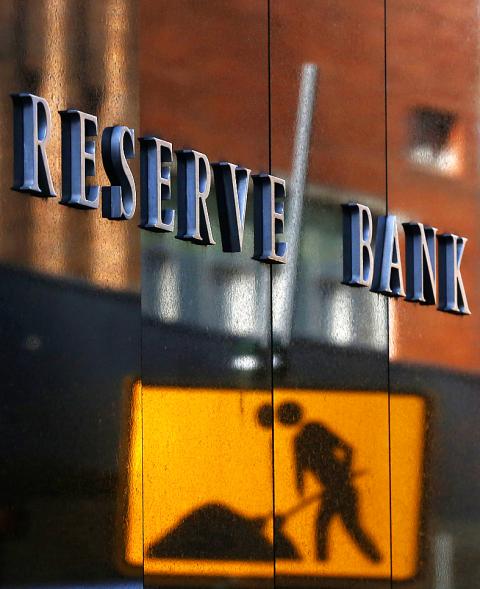Australia’s central bank cut its benchmark interest rate by one-quarter of a percentage point to a record-low 2.5 percent yesterday because of slower growth and weakening commodity prices.
The Reserve Bank of Australia’s decision was made at a monthly board meeting in the first week of a federal election campaign and was expected by most economists.
The bank last cut the Official Cash Rate, which is a benchmark for commercial lending rates, by one-quarter of a point in May, following four cuts last year.

Photo: Reuters
In a statement, Reserve Bank of Australia Governor Glenn Stevens said economic growth was below the long-term trend level of 3 percent, as the economy adjusts to lower levels of mining investment, but added that there was a “reasonable prospect” of it picking up next year.
Australia has enjoyed a decade-long boom in mining and related construction that helped it avoid recession during the global financial crisis. However, growth is now slowing as China’s economy cools and drags down prices for commodities such as iron ore and coal.
The Australian government last week nearly doubled its budget deficit forecast for the fiscal year through June next year to A$30.1 billion (US$26.8 billion), as slowing growth weighs on tax revenues.
Stevens said the Aussie dollar was still quite high despite falling by 15 percent since April. The Australian currency was little changed at just below US$0.90 immediately after the rate announcement.
“It is possible that the exchange rate will depreciate further over time, which would help to foster a rebalancing of growth in the economy,” he said.
Canberra last week downgraded its growth forecast for the current fiscal year beginning on July 1 from 2.75 percent to 2.5 percent.
The 2.5 percent policy rate is the lowest since the central bank’s inception in 1960.

ADVANCED: Previously, Taiwanese chip companies were restricted from building overseas fabs with technology less than two generations behind domestic factories Taiwan Semiconductor Manufacturing Co (TSMC, 台積電), a major chip supplier to Nvidia Corp, would no longer be restricted from investing in next-generation 2-nanometer chip production in the US, the Ministry of Economic Affairs said yesterday. However, the ministry added that the world’s biggest contract chipmaker would not be making any reckless decisions, given the weight of its up to US$30 billion investment. To safeguard Taiwan’s chip technology advantages, the government has barred local chipmakers from making chips using more advanced technologies at their overseas factories, in China particularly. Chipmakers were previously only allowed to produce chips using less advanced technologies, specifically

The New Taiwan dollar is on the verge of overtaking the yuan as Asia’s best carry-trade target given its lower risk of interest-rate and currency volatility. A strategy of borrowing the New Taiwan dollar to invest in higher-yielding alternatives has generated the second-highest return over the past month among Asian currencies behind the yuan, based on the Sharpe ratio that measures risk-adjusted relative returns. The New Taiwan dollar may soon replace its Chinese peer as the region’s favored carry trade tool, analysts say, citing Beijing’s efforts to support the yuan that can create wild swings in borrowing costs. In contrast,

TARIFF SURGE: The strong performance could be attributed to the growing artificial intelligence device market and mass orders ahead of potential US tariffs, analysts said The combined revenue of companies listed on the Taiwan Stock Exchange and the Taipei Exchange for the whole of last year totaled NT$44.66 trillion (US$1.35 trillion), up 12.8 percent year-on-year and hit a record high, data compiled by investment consulting firm CMoney showed on Saturday. The result came after listed firms reported a 23.92 percent annual increase in combined revenue for last month at NT$4.1 trillion, the second-highest for the month of December on record, and posted a 15.63 percent rise in combined revenue for the December quarter at NT$12.25 billion, the highest quarterly figure ever, the data showed. Analysts attributed the

Taiwan Semiconductor Manufacturing Co’s (TSMC, 台積電) quarterly sales topped estimates, reinforcing investor hopes that the torrid pace of artificial intelligence (AI) hardware spending would extend into this year. The go-to chipmaker for Nvidia Corp and Apple Inc reported a 39 percent rise in December-quarter revenue to NT$868.5 billion (US$26.35 billion), based on calculations from monthly disclosures. That compared with an average estimate of NT$854.7 billion. The strong showing from Taiwan’s largest company bolsters expectations that big tech companies from Alphabet Inc to Microsoft Corp would continue to build and upgrade datacenters at a rapid clip to propel AI development. Growth accelerated for